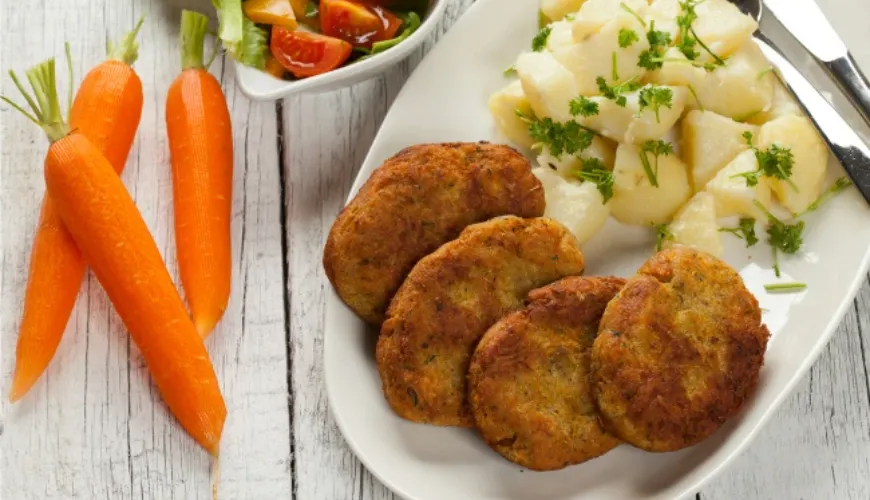
Reasons for the Onset of Ravenous Hunger and Tips on How to Avoid It

When We Are Overcome by Intense Hunger - What Lies Behind It and How to Handle It
Who hasn't experienced it — it's afternoon, lunch is far behind, and suddenly you feel like you could eat anything that comes your way. Sweet, salty, or both. Intense hunger is unpleasant, often comes unexpectedly, and rarely ends with just one bite. But why does it appear so suddenly, and what causes us to sometimes lose control over what and how much we eat?
It's probably not just your weak will. Intense hunger is a complex physiological and psychological phenomenon that can signal various imbalances in the body. Whether it's hormonal changes, fluctuations in blood sugar levels, or perhaps stress, it's always good to understand what's happening in your body.
What is Intense Hunger and Why Does It Occur
The term "intense hunger" refers to a sudden, often uncontrollable feeling of hunger that manifests both physically and psychologically. It can strike shortly after eating or when you don't actually need food at all. It typically leads to excessive calorie intake and the choice of foods that aren't very nutritious — such as sweets, pastries, and fried food. This phenomenon is not uncommon, affecting up to 30% of the population regularly, and it is more common in women than in men.
One of the main causes is fluctuations in blood glucose levels. If we often consume foods with a high glycemic index — like white bread, sugars, sweetened drinks — blood sugar levels spike sharply and then drop just as quickly. The body then reacts with panic and sends strong hunger signals. This cycle can continue all day.
Besides glucose, the hormone ghrelin also plays a role, which is naturally released in the stomach and brain and stimulates appetite. Lack of sleep, stress, or poor eating habits increase its levels, which also increases the likelihood of overeating.
Hunger or Just Craving? Recognition Can Help
An important first step is to realize whether you are truly hungry or if it's just a psychological need. True hunger comes gradually and is accompanied by signals like stomach growling, weakness, or irritability (the so-called "hangry" states). In contrast, intense hunger appears suddenly, has a strong emotional component, and usually leads to overeating.
A little trick can help in such moments: when you're hit by a strong craving for something unhealthy, try to imagine eating a plate of boiled vegetables or plain bread with butter. If that doesn't appeal to you and you only crave chocolate, it's probably not true hunger, but a psychological need.
Why It Is Important to Be Vigilant
For people with diabetes, intense hunger is not only more common but also more dangerous. Fluctuations in blood sugar levels — whether due to insulin therapy, irregular meals, or stress — can lead to hypoglycemia, i.e., too low blood sugar levels. The body defends itself and triggers a strong feeling of hunger, often accompanied by anxiety, tremors, or sweating.
In this case, intense hunger is not only unpleasant but can also be a signal that the body needs immediate help. Therefore, it's important to pay attention to meal timing during the day, monitor carbohydrate content in the diet, and always have something small to eat on hand, ideally with a low glycemic index.
A practical example is Aneta’s experience, who lives with type 1 diabetes. "When intense hunger strikes me, I know I need to check my blood sugar. Sometimes it's hypoglycemia, other times just unmanaged stress. What helps me the most is having a box of nuts and dried fruit on hand."
Pregnancy and Insatiable Appetite
Pregnancy is a period when almost everything changes — not just the body, but also cravings, daily rhythm, and emotional settings. Intense hunger during pregnancy is not unusual. The growing fetus increases energy demands, hormonal changes affect taste perception, and the body asks for the nutrients it needs.
The problem arises when a woman finds herself in a whirlwind of extreme cravings, often for unhealthy food. If intense hunger occurs regularly and leads to overeating, it can have consequences not only for the mother but also for the baby — for example, in the form of gestational diabetes or excessive weight gain.
According to research published in the Journal of Obstetrics and Gynaecology, intense hunger in pregnancy is often associated with a lack of protein, fiber, and quality fats in the diet. Therefore, try to supplement each meal with a portion of legumes, lean meat, quality whole grain bread, or avocado. You'll avoid not only hunger but also sugar fluctuations.
Why Does Intense Hunger Trigger Before Menstruation?
Many women know the week before menstruation when not only irritability increases but also cravings for sweets. Intense hunger before menstruation is a common phenomenon linked to hormonal fluctuations — especially the drop in estrogen and the increase in progesterone, which stimulates appetite.
The body also prepares for potential pregnancy and therefore higher energy expenditures. The result is an increased need for calories and often a craving for carbohydrates, which temporarily improve mood. It's not weakness; it's a biological reaction.
The experience of many women shows that it helps to prepare in advance. Instead of chocolate, have dark chocolate with a higher cocoa content at hand, instead of cookies, homemade energy bars with oats, seeds, and honey. It's also important not to forget about magnesium and vitamin B6, which can help alleviate premenstrual cravings.
Main Causes of Intense Hunger to Watch Out For
Intense hunger doesn't fall from the sky, although it may sometimes seem that way. Its roots run deep into lifestyle. The most common causes include:
- Poor or irregular diet – lacking protein, fiber, and healthy fats
- Fluctuating blood sugar levels – an excess of simple carbohydrates in the diet
- Stress and emotional tension – food as an escape or reward
- Lack of sleep – the body tries to compensate for energy with calories
- Hormonal changes – menstruation, pregnancy, menopause
- Dehydration – sometimes hunger is confused with thirst
So how do you fight intense hunger? "The best strategy is prevention," says nutrition therapist Tereza Havlínová. "A balanced diet, regular meals, enough sleep, and mindful stress management are important." Advice that sounds simple but requires patience and a bit of self-reflection.
In everyday life, this might mean preparing a snack for the next day in the evening, tossing a handful of nuts into your bag instead of a chocolate bar, and choosing a book and early sleep over social media in the evening. Small things that have a big impact.
Intense hunger is not a weakness but a signal. Learning to listen to it, recognizing when it's real and when our psyche is asking for something, is the key to a healthier relationship with food and ourselves.

